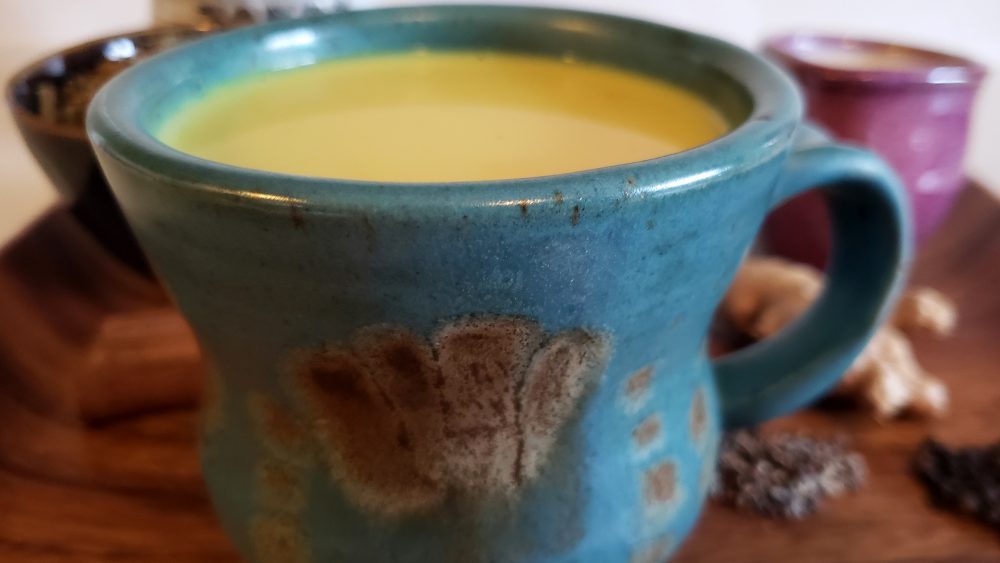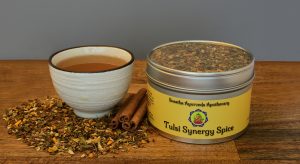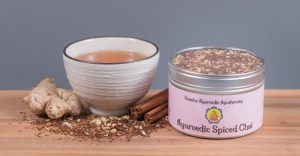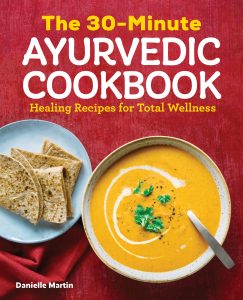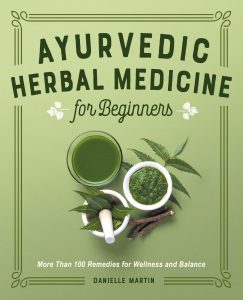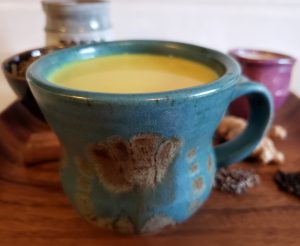 Chai is a spiced tea from India that is both delicious and healing. Although it is traditionally made using black tea, it can be equally as tasty using a caffeine-free herbal tea base. Tulsi is an amazing option for this purpose, with its delightfully sweet and spicy flavor, its warming nature, and its long list of healing properties.
Chai is a spiced tea from India that is both delicious and healing. Although it is traditionally made using black tea, it can be equally as tasty using a caffeine-free herbal tea base. Tulsi is an amazing option for this purpose, with its delightfully sweet and spicy flavor, its warming nature, and its long list of healing properties.
This tasty blend of tulsi, turmeric, ginger, and black pepper offers a wealth of health benefits including sparking digestion, stimulating metabolism, flushing toxins, increasing circulation, calming the mind (aka Vata), and removing excessive Kapha (e.g. heaviness, congestion, dullness, depression). These Ayurvedic herbal staples are often used to soothe allergies, reduce inflammation, and strengthen the immune system. Due to the warming nature of this recipe, it is highly beneficial for both Vata and Kapha types alike; however, Pitta types may become a bit overheated with this recipe and should follow the recommended Pitta variations listed below the recipe.
Health Benefits of Tulsi Turmeric Chai
- Increases digestion and metabolism
- Promotes warmth in the system
- Increases healthy circulation
- Reduces inflammation
- Removes cough and congestion (non-dairy milk should be used for this)
- Alleviate allergies (non-dairy milk should be used for this)
- Boosts immunity
- Opens heart energy
- Reduces depression and lethargy
- Stimulates a foggy, dull mind
- Calms Vata
- Stimulates Kapha
Read more on the health benefits of tulsi here.
Read more on the health benefits of turmeric here.
Tulsi Turmeric Chai Recipe
Click here for a printable copy of this recipe.
- Doshic effect: Vata ↓, Pitta ↑*, Kapha ↓*
- Makes: 4 cups
- Cook Time: 20 minutes
- Gluten-free, Vegetarian (can be made vegan)
*See the optional Pitta and Kapha variations listed below the recipe to make this recipe more suitable for these body types.
Materials
- Medium saucepan
- Ginger grater (optional but recommended)
- Measuring cups and spoons
Ingredients
- 2 cups milk or milk substitute – see doshic variations for the best milk options per dosha
- 3 cups water
- 4 tablespoons tulsi leaf
- Freshly grated ginger (2” cube), substitute with 1 to 2 teaspoons ginger powder if needed
- 1 teaspoon turmeric powder (or freshly grated turmeric root – best!)
- 3 to 4 cinnamon sticks
- 15 to 20 whole black peppercorns
- 1 teaspoon whole cardamom seeds, hulled
- 8 to 10 cloves, whole
- Honey
*All Amazon links are affiliated but are recommended with care and honesty.
Click here for a printable copy of this recipe.
Directions
1. Heat the milk and water in a medium saucepan until it reaches just below a boiling point.
2. Reduce the heat to a simmer and add in the tulsi leaf, grated ginger, turmeric, black peppercorns, cinnamon sticks, cardamom seeds, and cloves. Stir well.
3. Cook covered on a low simmer for 15 to 20 minutes*, stirring every 5 minutes. Leave a small crack in the lid to allow a small amount of water to evaporate.
*A longer steep can be utilized if preferred, although more water should be added as needed. The final yield should be about 4 cups.
4. After the desired steep time is complete, strain out the herbs and spices.
5. Pour the strained chai into separate mugs and allow the beverage to cool a bit. Once the tea is at a drinkable temperature (ideally under 108 degrees) add 1 to 2 teaspoons of honey to each mug.
6. Sip and enjoy this tea as a morning or mid-day pick-me-up, or as a soothing treat before bed (it is great for both!).
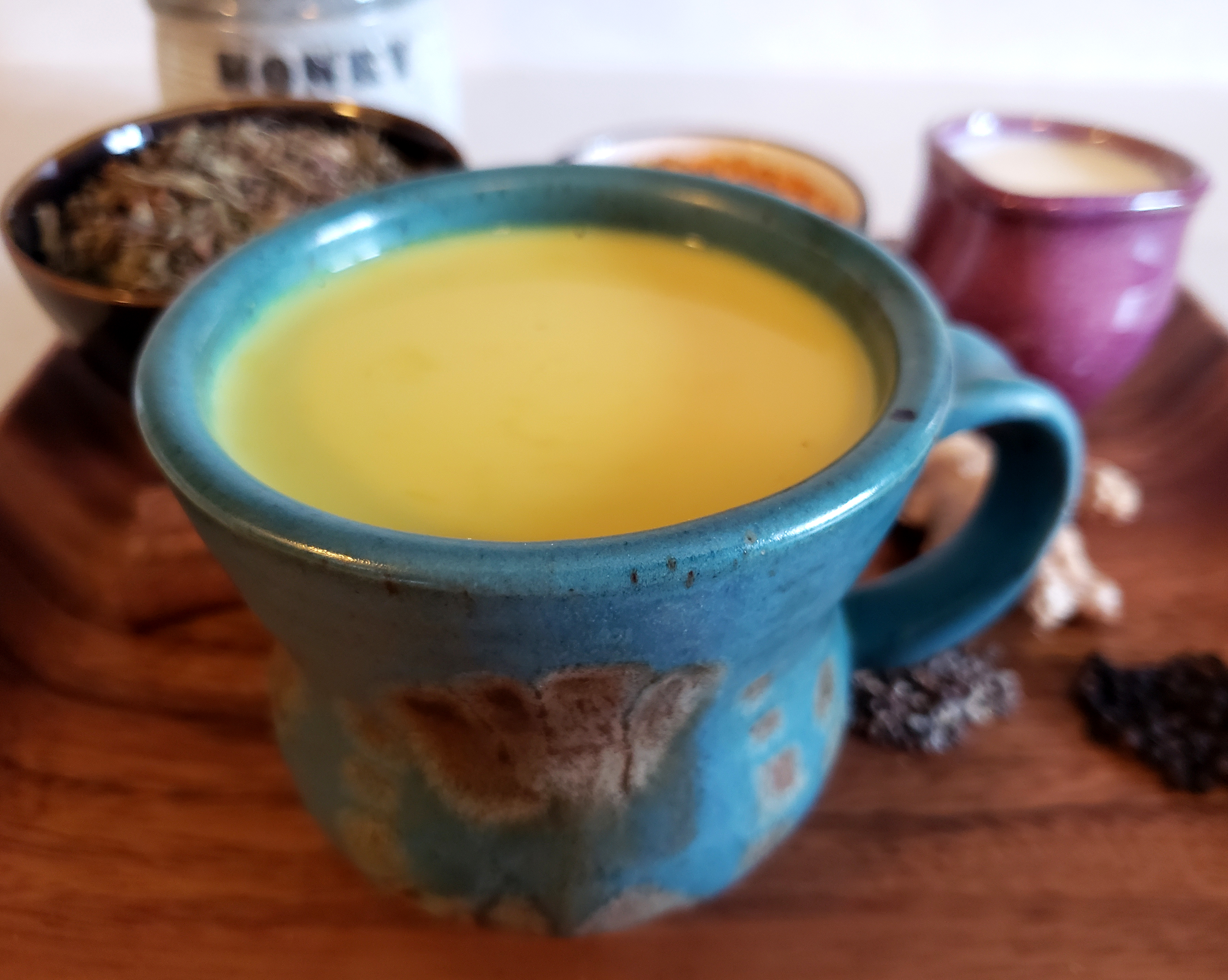
Optional Doshic Variations
Vata:
This recipe is very beneficial for pacifying Vata dosha. The best milk options for Vata will be whole, organic cow milk or homemade almond milk. If available the fresh ginger will be a better choice for Vata than the dry ginger.
Pitta:
Overall this recipe is considered heating due to the warming nature of most of the ingredients. However, the dairy will cool the recipe down and therefore if Pitta is in balance and it is the winter or fall season, Pitta types should be able to enjoy this healing beverage when using these modifications. Reduce the cinnamon to 2 sticks and the black peppercorns to 10 (or use 15 Pippali fruits instead!). Fresh ginger should be used instead of dry and the honey can be replaced with maple syrup. The best milk options for Pitta will be whole, organic cow milk, homemade almond milk, or homemade coconut milk.
Kapha:
This recipe is overall Kapha reducing due to the warm, spicy nature of the beverage. However, cow dairy can increase Kapha and therefore it will be best to avoid using cow milk. Instead, Kapha types should use goat’s milk, homemade almond milk, homemade hemp milk, or homemade pumpkin seed milk. If this is still too heavy or congestive for your Kapha, please replace one cup of milk with one cup of water (one cup milk, four cups water total). Dry ginger will be more beneficial than fresh (although both will be suitable) and all the spices can be increased as desired to make an even spicier, Kapha-reducing chai.
Try our Tulsi Synergy Spice tea blend!
Try our caffeine-free Ayurvedic Spiced Chai!
Discover more healing recipes with my 30-Minute Ayurvedic Cookbook!*
Discover over 100 herbal remedies in my Ayurvedic Herbal Medicine for Beginners book!*
*All Amazon links are affiliated but are recommended with care and honesty.

